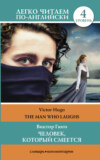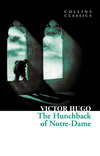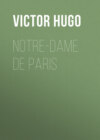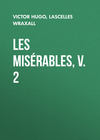Czytaj książkę: «The Man Who Laughs», strona 11
CHAPTER XVIII.
THE HIGHEST RESOURCE
The wreck being lightened, was sinking more slowly, but none the less surely.
The hopelessness of their situation was without resource – without mitigation; they had exhausted their last expedient.
"Is there anything else we can throw overboard?"
The doctor, whom every one had forgotten, rose from the companion, and said,
"Yes."
"What?" asked the chief.
The doctor answered, "Our Crime."
They shuddered, and all cried out, —
"Amen."
The doctor standing up, pale, raised his hand to heaven, saying, —
"Kneel down."
They wavered – to waver is the preface to kneeling down.
The doctor went on, —
"Let us throw our crimes into the sea, they weigh us down; it is they that are sinking the ship. Let us think no more of safety – let us think of salvation. Our last crime, above all, the crime which we committed, or rather completed, just now – O wretched beings who are listening to me – it is that which is overwhelming us. For those who leave intended murder behind them, it is an impious insolence to tempt the abyss. He who sins against a child, sins against God. True, we were obliged to put to sea, but it was certain perdition. The storm, warned by the shadow of our crime, came on. It is well. Regret nothing, however. There, not far off in the darkness, are the sands of Vauville and Cape la Hogue. It is France. There was but one possible shelter for us, which was Spain. France is no less dangerous to us than England. Our deliverance from the sea would have led but to the gibbet. Hanged or drowned – we had no alternative. God has chosen for us; let us give Him thanks. He has vouchsafed us the grave which cleanses. Brethren, the inevitable hand is in it. Remember that it was we who just now did our best to send on high that child, and that at this very moment, now as I speak, there is perhaps, above our heads, a soul accusing us before a Judge whose eye is on us. Let us make the best use of this last respite; let us make an effort, if we still may, to repair, as far as we are able, the evil that we have wrought. If the child survives us, let us come to his aid; if he is dead, let us seek his forgiveness. Let us cast our crime from us. Let us ease our consciences of its weight. Let us strive that our souls be not swallowed up before God, for that is the awful shipwreck. Bodies go to the fishes, souls to the devils. Have pity on yourselves. Kneel down, I tell you. Repentance is the bark which never sinks. You have lost your compass! You are wrong! You still have prayer."
The wolves became lambs – such transformations occur in last agonies; tigers lick the crucifix; when the dark portal opens ajar, belief is difficult, unbelief impossible. However imperfect may be the different sketches of religion essayed by man, even when his belief is shapeless, even when the outline of the dogma is not in harmony with the lineaments of the eternity he foresees, there comes in his last hour a trembling of the soul. There is something which will begin when life is over; this thought impresses the last pang.
A man's dying agony is the expiration of a term. In that fatal second he feels weighing on him a diffused responsibility. That which has been complicates that which is to be. The past returns and enters into the future. What is known becomes as much an abyss as the unknown. And the two chasms, the one which is full by his faults, the other of his anticipations, mingle their reverberations. It is this confusion of the two gulfs which terrifies the dying man.
They had spent their last grain of hope on the direction of life; hence they turned in the other. Their only remaining chance was in its dark shadow. They understood it. It came on them as a lugubrious flash, followed by the relapse of horror. That which is intelligible to the dying man is as what is perceived in the lightning. Everything, then nothing; you see, then all is blindness. After death the eye will reopen, and that which was a flash will become a sun.
They cried out to the doctor, —
"Thou, thou, there is no one but thee. We will obey thee, what must we do? Speak."
The doctor answered, —
"The question is how to pass over the unknown precipice and reach the other bank of life, which is beyond the tomb. Being the one who knows the most, my danger is greater than yours. You do well to leave the choice of the bridge to him whose burden is the heaviest."
He added, —
"Knowledge is a weight added to conscience."
He continued, —
"How much time have we still?"
Galdeazun looked at the water-mark, and answered, —
"A little more than a quarter of an hour."
"Good," said the doctor.
The low hood of the companion on which he leant his elbows made a sort of table; the doctor took from his pocket his inkhorn and pen, and his pocket-book out of which he drew a parchment, the same one on the back of which he had written, a few hours before, some twenty cramped and crooked lines.
"A light," he said.
The snow, falling like the spray of a cataract, had extinguished the torches one after another; there was but one left. Ave Maria took it out of the place where it had been stuck, and holding it in his hand, came and stood by the doctor's side.
The doctor replaced his pocket-book in his pocket, put down the pen and inkhorn on the hood of the companion, unfolded the parchment, and said, —
"Listen."
Then in the midst of the sea, on the failing bridge (a sort of shuddering flooring of the tomb), the doctor began a solemn reading, to which all the shadows seemed to listen. The doomed men bowed their heads around him. The flaming of the torch intensified their pallor. What the doctor read was written in English. Now and then, when one of those woebegone looks seemed to ask an explanation, the doctor would stop, to repeat – whether in French, or Spanish, Basque, or Italian – the passage he had just read. Stifled sobs and hollow beatings of the breast were heard. The wreck was sinking more and more.
The reading over, the doctor placed the parchment flat on the companion, seized his pen, and on a clear margin which he had carefully left at the bottom of what he had written, he signed himself, GERNARDUS GEESTEMUNDE: Doctor.
Then, turning towards the others, he said, —
"Come, and sign."
The Basque woman approached, took the pen, and signed herself, ASUNCION.
She handed the pen to the Irish woman, who, not knowing how to write, made a cross.
The doctor, by the side of this cross, wrote, BARBARA FERMOY, of Tyrrif Island, in the Hebrides.
Then he handed the pen to the chief of the band.
The chief signed, GAIZDORRA: Captal.
The Genoese signed himself under the chief's name. GIANGIRATE.
The Languedocian signed, JACQUES QUARTOURZE: alias, the Narbonnais.
The Provençal signed, LUC-PIERRE CAPGAROUPE, of the Galleys of Mahon.
Under these signatures the doctor added a note: —
"Of the crew of three men, the skipper having been washed overboard by a sea, but two remain, and they have signed."
The two sailors affixed their names underneath the note. The northern Basque signed himself, GALDEAZUN.
The southern Basque signed, AVE MARIA: Robber.
Then the doctor said, —
"Capgaroupe."
"Here," said the Provençal.
"Have you Hardquanonne's flask?"
"Yes."
"Give it me."
Capgaroupe drank off the last mouthful of brandy, and handed the flask to the doctor.
The water was rising in the hold; the wreck was sinking deeper and deeper into the sea. The sloping edges of the ship were covered by a thin gnawing wave, which was rising. All were crowded on the centre of the deck.
The doctor dried the ink on the signatures by the heat of the torch, and folding the parchment into a narrower compass than the diameter of the neck, put it into the flask. He called for the cork.
"I don't know where it is," said Capgaroupe.
"Here is a piece of rope," said Jacques Quartourze.
The doctor corked the flask with a bit of rope, and asked for some tar. Galdeazun went forward, extinguished the signal light with a piece of tow, took the vessel in which it was contained from the stern, and brought it, half full of burning tar, to the doctor.
The flask holding the parchment which they had all signed was corked and tarred over.
"It is done," said the doctor.
And from out all their mouths, vaguely stammered in every language, came the dismal utterances of the catacombs.
"Ainsi soit-il!"
"Mea culpa!"
"Asi sea!"
"Aro raï!"
"Amen!"
It was as though the sombre voices of Babel were scattered through the shadows as Heaven uttered its awful refusal to hear them.
The doctor turned away from his companions in crime and distress, and took a few steps towards the gunwale. Reaching the side, he looked into space, and said, in a deep voice, —
"Bist du bei mir?"[8]
Perchance he was addressing some phantom.
The wreck was sinking.
Behind the doctor all the others were in a dream. Prayer mastered them by main force. They did not bow, they were bent. There was something involuntary in their condition; they wavered as a sail flaps when the breeze fails. And the haggard group took by degrees, with clasping of hands and prostration of foreheads, attitudes various, yet of humiliation. Some strange reflection of the deep seemed to soften their villainous features.
The doctor returned towards them. Whatever had been his past, the old man was great in the presence of the catastrophe.
The deep reserve of nature which enveloped him preoccupied without disconcerting him. He was not one to be taken unawares. Over him was the calm of a silent horror: on his countenance the majesty of God's will comprehended.
This old and thoughtful outlaw unconsciously assumed the air of a pontiff.
He said, —
"Attend to me."
He contemplated for a moment the waste of water, and added, —
"Now we are going to die."
Then he took the torch from the hands of Ave Maria, and waved it.
A spark broke from it and flew into the night.
Then the doctor cast the torch into the sea.
The torch was extinguished: all light disappeared. Nothing left but the huge, unfathomable shadow. It was like the filling up of the grave.
In the darkness the doctor was heard saying, —
"Let us pray."
All knelt down.
It was no longer on the snow, but in the water, that they knelt.
They had but a few minutes more.
The doctor alone remained standing.
The flakes of snow falling on him had sprinkled him with white tears, and made him visible on the background of darkness. He might have been the speaking statue of the shadow.
The doctor made the sign of the cross and raised his voice, while beneath his feet he felt that almost imperceptible oscillation which prefaces the moment in which a wreck is about to founder. He said, —
"Pater noster qui es in coelis."
The Provençal repeated in French, —
"Notre Père qui êtes aux cieux."
The Irishwoman repeated in Gaelic, understood by the Basque woman, —
"Ar nathair ata ar neamh."
The doctor continued, —
"Sanctificetur nomen tuum."
"Que votre nom soit sanctifié," said the Provençal.
"Naomhthar hainm," said the Irishwoman.
"Adveniat regnum tuum," continued the doctor.
"Que votre règne arrive," said the Provençal.
"Tigeadh do rioghachd," said the Irishwoman.
As they knelt, the waters had risen to their shoulders. The doctor went on, —
"Fiat voluntas tua."
"Que votre volonté soit faite," stammered the Provençal.
And the Irishwoman and Basque woman cried, —
"Deuntar do thoil ar an Hhalàmb."
"Sicut in coelo, sicut in terra," said the doctor.
No voice answered him.
He looked down. All their heads were under water. They had let themselves be drowned on their knees.
The doctor took in his right hand the flask which he had placed on the companion, and raised it above his head.
The wreck was going down. As he sank, the doctor murmured the rest of the prayer.
For an instant his shoulders were above water, then his head, then nothing remained but his arm holding up the flask, as if he were showing it to the Infinite.
His arm disappeared; there was no greater fold on the deep sea than there would have been on a tun of oil. The snow continued falling.
One thing floated, and was carried by the waves into the darkness. It was the tarred flask, kept afloat by its osier cover.
BOOK THE THIRD.
THE CHILD IN THE SHADOW
CHAPTER I.
CHESIL
The storm was no less severe on land than on sea. The same wild enfranchisement of the elements had taken place around the abandoned child. The weak and innocent become their sport in the expenditure of the unreasoning rage of their blind forces. Shadows discern not, and things inanimate have not the clemency they are supposed to possess.
On the land there was but little wind. There was an inexplicable dumbness in the cold. There was no hail. The thickness of the falling snow was fearful.
Hailstones strike, harass, bruise, stun, crush. Snowflakes do worse: soft and inexorable, the snowflake does its work in silence; touch it, and it melts. It is pure, even as the hypocrite is candid. It is by white particles slowly heaped upon each other that the flake becomes an avalanche and the knave a criminal.
The child continued to advance into the mist. The fog presents but a soft obstacle; hence its danger. It yields, and yet persists. Mist, like snow, is full of treachery. The child, strange wrestler at war with all these risks, had succeeded in reaching the bottom of the descent, and had gained Chesil. Without knowing it he was on an isthmus, with the ocean on each side; so that he could not lose his way in the fog, in the snow, or in the darkness, without falling into the deep waters of the gulf on the right hand, or into the raging billows of the high sea on the left. He was travelling on, in ignorance, between these two abysses.
The Isthmus of Portland was at this period singularly sharp and rugged. Nothing remains at this date of its past configuration. Since the idea of manufacturing Portland stone into Roman cement was first seized, the whole rock has been subjected to an alteration which has completely changed its original appearance. Calcareous lias, slate, and trap are still to be found there, rising from layers of conglomerate, like teeth from a gum; but the pickaxe has broken up and levelled those bristling, rugged peaks which were once the fearful perches of the ossifrage. The summits exist no longer where the labbes and the skua gulls used to flock together, soaring, like the envious, to sully high places. In vain might you seek the tall monolith called Godolphin, an old British word, signifying "white eagle." In summer you may still gather on those surfaces, pierced and perforated like a sponge, rosemary, pennyroyal, wild hyssop, and sea-fennel which when infused makes a good cordial, and that herb full of knots, which grows in the sand and from which they make matting; but you no longer find gray amber, or black tin, or that triple species of slate – one sort green, one blue, and the third the colour of sage-leaves. The foxes, the badgers, the otters, and the martens have taken themselves off; on the cliffs of Portland, as well as at the extremity of Cornwall, where there were at one time chamois, none remain. They still fish in some inlets for plaice and pilchards; but the scared salmon no longer ascend the Wey, between Michaelmas and Christmas, to spawn. No more are seen there, as during the reign of Elizabeth, those old unknown birds as large as hawks, who could cut an apple in two, but ate only the pips. You never meet those crows with yellow beaks, called Cornish choughs in English, pyrrocorax in Latin, who, in their mischief, would drop burning twigs on thatched roofs. Nor that magic bird, the fulmar, a wanderer from the Scottish archipelago, dropping from his bill an oil which the islanders used to burn in their lamps. Nor do you ever find in the evening, in the plash of the ebbing tide, that ancient, legendary neitse, with the feet of a hog and the bleat of a calf. The tide no longer throws up the whiskered seal, with its curled ears and sharp jaws, dragging itself along on its nailless paws. On that Portland – nowadays so changed as scarcely to be recognized – the absence of forests precluded nightingales; but now the falcon, the swan, and the wild goose have fled. The sheep of Portland, nowadays, are fat and have fine wool; the few scattered ewes, which nibbled the salt grass there two centuries ago, were small and tough and coarse in the fleece, as became Celtic flocks brought there by garlic-eating shepherds, who lived to a hundred, and who, at the distance of half a mile, could pierce a cuirass with their yard-long arrows. Uncultivated land makes coarse wool. The Chesil of to-day resembles in no particular the Chesil of the past, so much has it been disturbed by man and by those furious winds which gnaw the very stones.
At present this tongue of land bears a railway, terminating in a pretty square of houses, called Chesilton, and there is a Portland station. Railway carriages roll where seals used to crawl.
The Isthmus of Portland two hundred years ago was a back of sand, with a vertebral spine of rock.
The child's danger changed its form. What he had had to fear in the descent was falling to the bottom of the precipice; in the isthmus, it was falling into the holes. After dealing with the precipice, he must deal with the pitfalls. Everything on the sea-shore is a trap – the rock is slippery, the strand is quicksand. Resting-places are but snares. It is walking on ice which may suddenly crack and yawn with a fissure, through which you disappear. The ocean has false stages below, like a well-arranged theatre.
The long backbone of granite, from which fall away both slopes of the isthmus, is awkward of access. It is difficult to find there what, in scene-shifters' language, are termed practicables. Man has no hospitality to hope for from the ocean; from the rock no more than from the wave. The sea is provident for the bird and the fish alone. Isthmuses are especially naked and rugged; the wave, which wears and mines them on either side, reduces them to the simplest form. Everywhere there were sharp relief ridges, cuttings, frightful fragments of torn stone, yawning with many points, like the jaws of a shark; breaknecks of wet moss, rapid slopes of rock ending in the sea. Whosoever undertakes to pass over an isthmus meets at every step misshapen blocks, as large as houses, in the forms of shin-bones, shoulder-blades, and thigh-bones, the hideous anatomy of dismembered rocks. It is not without reason that these striæ of the sea-shore are called côtes.[9]
The wayfarer must get out as he best can from the confusion of these ruins. It is like journeying over the bones of an enormous skeleton.
Put a child to this labour of Hercules.
Broad daylight might have aided him. It was night. A guide was necessary. He was alone. All the vigour of manhood would not have been too much. He had but the feeble strength of a child. In default of a guide, a footpath might have aided him; there was none.
By instinct he avoided the sharp ridge of the rocks, and kept to the strand as much as possible. It was there that he met with the pitfalls. They were multiplied before him under three forms: the pitfall of water, the pitfall of snow, and the pitfall of sand. This last is the most dangerous of all, because the most illusory. To know the peril we face is alarming; to be ignorant of it is terrible. The child was fighting against unknown dangers. He was groping his way through something which might, perhaps, be the grave.
He did not hesitate. He went round the rocks, avoided the crevices, guessed at the pitfalls, obeyed the twistings and turnings caused by such obstacles, yet he went on. Though unable to advance in a straight line, he walked with a firm step. When necessary, he drew back with energy. He knew how to tear himself in time from the horrid bird-lime of the quicksands. He shook the snow from about him. He entered the water more than once up to the knees. Directly that he left it, his wet knees were frozen by the intense cold of the night. He walked rapidly in his stiffened garments; yet he took care to keep his sailor's coat dry and warm on his chest. He was still tormented by hunger.
The chances of the abyss are illimitable. Everything is possible in it, even salvation. The issue may be found, though it be invisible. How the child, wrapped in a smothering winding-sheet of snow, lost on a narrow elevation between two jaws of an abyss, managed to cross the isthmus is what he could not himself have explained. He had slipped, climbed, rolled, searched, walked, persevered, that is all. Such is the secret of all triumphs. At the end of somewhat less than half an hour he felt that the ground was rising. He had reached the other shore. Leaving Chesil, he had gained terra firma.
The bridge which now unites Sandford Castle with Smallmouth Sands did not then exist. It is probable that in his intelligent groping he had reascended as far as Wyke Regis, where there was then a tongue of sand, a natural road crossing East Fleet.
He was saved from the isthmus; but he found himself again face to face with the tempest, with the cold, with the night.
Before him once more lay the plain, shapeless in the density of impenetrable shadow. He examined the ground, seeking a footpath. Suddenly he bent down. He had discovered, in the snow, something which seemed to him a track.
It was indeed a track – the print of a foot. The print was cut out clearly in the whiteness of the snow, which rendered it distinctly visible. He examined it. It was a naked foot; too small for that of a man, too large for that of a child.
It was probably the foot of a woman. Beyond that mark was another, then another, then another. The footprints followed each other at the distance of a step, and struck across the plain to the right. They were still fresh, and slightly covered with little snow. A woman had just passed that way.
This woman was walking in the direction in which the child had seen the smoke. With his eyes fixed on the footprints, he set himself to follow them.



















